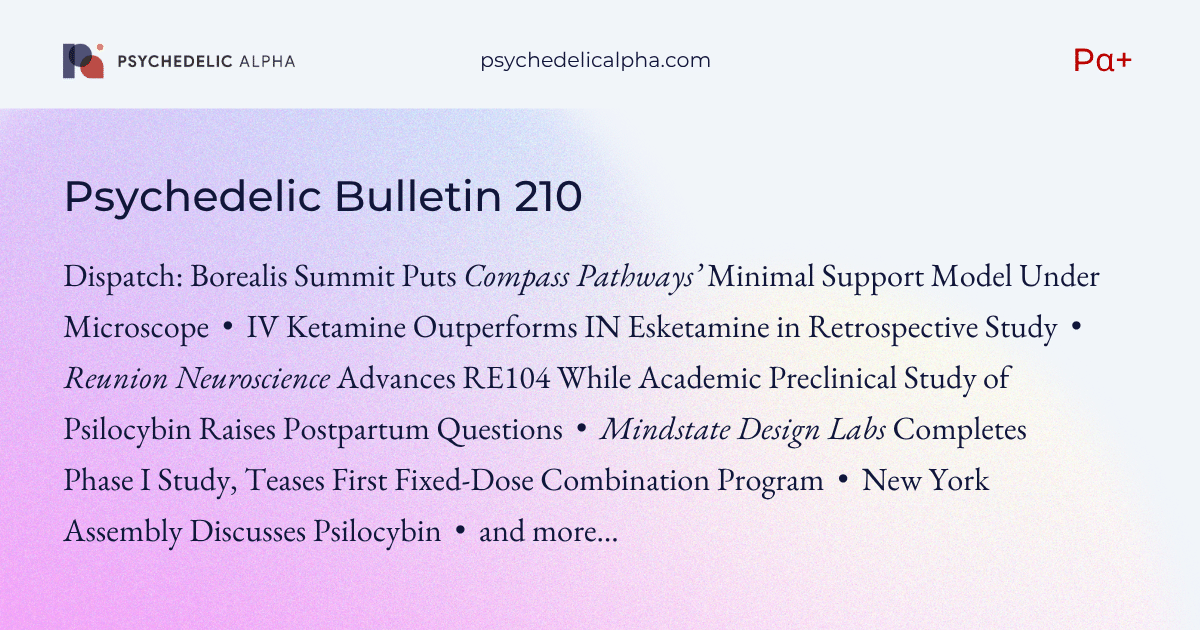In this Issue
- Dispatch: Borealis Summit Puts Compass’ Minimal Support Model Under Microscope
- Keynote: Compass CMO Tackles Critics Head-On
- From “Psychotherapy Echoes” to In-Session Silences
- Expectation, Unblinding, and the Placebo Puzzle
- Oceanic Boundlessness and ‘Brain Effects’: What Drives Response?
- Panel: Psychedelic-Assisted Therapy or Therapy-Assisted Psychedelics?
- IV Ketamine Outperforms IN Esketamine in Retrospective Study
- Reunion Advances RE104 While Academic Preclinical Study of Psilocybin Raises Postpartum Questions
- Other Stories
- Mindstate Completes Phase I Study, Teases First Fixed-Dose Combination Program
- New York Assembly Discusses Psilocybin
- Neurocentrx Secures $5M+ From Wellcome to Advance Abuse-Deterrent Ketamine Capsules and Digital Tool Combo
- and more…
***
Dispatch: Borealis Summit Puts Compass’ Minimal Support Model Under Microscope
I (Josh Hardman, the Editor) had a wonderful time in Stockholm last week for the Borealis Psychedelic Science Summit.
While there was a great diversity of talks and discussions, for our purposes, I decided to focus this dispatch on two sessions:
- A keynote presentation by Guy Goodwin, Compass Pathways’ Chief Medical Officer
- A panel discussion on the role of psychotherapy in psychedelic treatments
***
Keynote: Compass CMO Tackles Critics Head-On
In a keynote titled “Can We Re-Medicalise the Psychedelic Experience?”, Compass’ Chief Medical Officer Guy Goodwin recounted some of the “hassle” that psychedelic drug developers must contend with in trying to get psychedelics approved by regulators.
The talk provides a good look at how one of the field’s leading drug developers, with the most mature Phase 3 program, is justifying the design of its studies and building what it hopes proves to be an FDA-friendly narrative around its dataset.
He began by addressing Lykos Therapeutics’ receipt of a Complete Response Letter from the FDA last August, which he explained was due to three core issues (“selective collection of adverse events, absence of evidence for durability beyond 8 weeks, and 40% prior use of MDMA”, in the words of his slides).
“My job, essentially, is to avoid getting this letter!”, he told the crowd, before sharing how Compass is approaching its development of synthetic psilocybin (COMP360), with its lead program targeting treatment-resistant depression (TRD).
That lead program is substantial: “When we submit this, we will have over a thousand patients randomised”, he explained, referring to the combined population of the company’s randomised trials in the condition.
But the primary goal of Goodwin’s presentation was to attempt to address critiques of psychedelic drug development programs by academics. Those include unblinding and placebo effects, nocebo effects in the control arm, and the argument that “this isn’t about drugs, it’s about psychotherapy.”
“If you put those three things together, the result is confusion”, he continued, “and it’s my job to clarify this and to try to make the job for the FDA much easier, so that they don’t hear these messages buzzing in their ears as they look at our 1,000-patient data.”
Goodwin took a three-pronged approach to tackling these concerns, discussing:
- whether therapy biases outcomes, and whether what Compass is doing is therapy
- whether the placebo response is “all about expectations”, and whether unblinding drives outcomes
- and, “what actually does drive the clinical response that we see?”
***
From “Psychotherapy Echoes” to In-Session Silences
First up, Goodwin explored whether psychotherapy can introduce bias. “I think it’s obvious it can”, Goodwin acknowledged right off the bat, adding: “we know that there can be bias in psychotherapy trials.” The issue, therefore, he said, “is whether or not it is psychotherapy [in our trials].”
The Compass CMO emphasised that Lykos had always maintained that it was doing psychotherapy, whereas Compass is taking a different approach. “We have to teach therapists to not disturb the patients in their journeys”, he said, adding, “distraction would reduce the probability that you get an immersive experience.”
The preparation, support, and follow-up that Compass’ protocol features are, Goodwin says, necessary due to “the nature of the experience and the vulnerability of patients during it”. Still, he acknowledged what he called “psychotherapy echoes” inherent in this type of provision, which he said he thinks “are still in our protocols, without it being psychotherapy”. Given that fact, he said that what really matters is showing that therapists “behave consistently”.
That’s why, he says, the company records all its sessions and transmits them to a third party, mpathic, which assesses fidelity to its protocol (see Kirlić et al., 2024) across arms. He says that the company is looking for >80% fidelity to the protocol in each transcript (though, evidence was not shared), and compared it to conventional psychotherapy. “If you audit psychotherapy transcripts in the same way, you’re lucky to get over 65%”, he claimed.
“So we think we can deliver a very standard support to patients”, Goodwin said, “and so we can say hand on heart to the FDA, ‘this is a support that allows you to interpret the effects of the drug, it isn’t about psychotherapy.’”
The company has gone even further, looking at speech output in different phases of the protocol. “We’ve gone madly quantitative on this”, Goodwin told the audience.
The first figure that Goodwin shared shows participant and therapist utterances at the final preparation session (V2), the dosing session (V3), and follow-up visits (V4-6). The data represent 18 PTSD patients in COMP201, an open-label study where all participants received 25 mg of psilocybin…
Join Pα+ Today
Independent data-driven reporting, analysis and commentary on the psychedelics space: from business and drug development through to policy reform and culture.
Already a member? Log In
✓ Regular Bulletins covering key topics and trends in the psychedelics space
✓ Regular articles and deep dives across psychedelic research, policy and business
✓ Interviews with insiders
✓ Monthly interactive database and commentary on psychedelic patents
✓ Quick-take analysis of major developments
✓ A Library of primers and explainers
✓ Access to our full back catalogue


